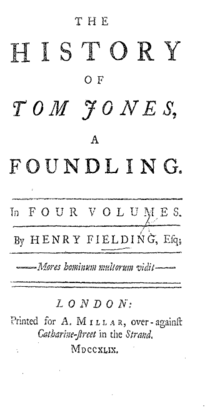
 We’re in the last book, nearing the end of the novel and therefore ehhhhhh-verything is going to be revealed. And things at Mrs. Miller’s are busy for Squire Allworthy this day.
We’re in the last book, nearing the end of the novel and therefore ehhhhhh-verything is going to be revealed. And things at Mrs. Miller’s are busy for Squire Allworthy this day.
Square, who the reader may remember as the less-religious tutor for Tom and Blifil is dying, and has got real religion. Now has been driven to confess to everyone he can think of to clear his conscience and hopefully make things right.
As part of this effort, he sends a letter to Allworthy, in part, he states:
Believe me, my friend, this young man hath the noblest generosity of heart, the most perfect capacity for friendship, the highest integrity, and indeed every virtue which can ennoble a man. He hath some faults, but among them is not to be numbered the least want of duty or gratitude towards you. On the contrary, I am satisfied, when you dismissed him from your house, his heart bled for you more than for himself.
Allworthy also gets a letter from Thwackum, having heard of the murder accusation, who goes on and on about Tom’s villainy—and tries to get Allworthy’s support for a job. Allworthy’s a little shaken by this, but not that much.
But wait, there’s more.
We then discover that Allworthy’s lawyer, Dowling, was one of the men Nightingale talked to at the alehouse when he got the truth from Fellamar’s goons about the attempt to press him into the Navy via this trumped-up charge. Nightingale assumed Dowling was there, like he was, to gather information to help Tom. Allworthy is stunned by this news. Blifil explains it away—over the outspoken skepticism of Mrs. Miller.
Patridge stops by right then to update Mrs. Miller, but Allworthy corners him and
asked him many questions concerning Jones, as to his health, and other matters; to all which Partridge answered, without having the least regard to what was, but considered only what he would have things appear; for a strict adherence to truth was not among the articles of this honest fellow’s morality or his religion.
Allworthy then gets everyone to leave and speaks frankly with Partridge, accusing him of being Tom’s father. Partridge denies it, ” he was no more the father of Jones than of the Pope of Rome”. It’s at this point that Mrs. Waters shows up, and things get really interesting.
Also, it should be noted that by now, that anything that Mr. Square has said has quite been forgotten.
Partridge calls on Mrs. Waters to be a witness—if anyone can state definitively that he’s not the father, it has to be the mother, right? But, no. She flat out states that’s not the case (which will greatly relieve Tom, I’m sure)
I’m not really going to try to summarize what says:
“I am not his mother; nor would I now think myself so for the world….So far what I confest,” said she, “was true, that these hands conveyed the infant to your bed; conveyed it thither at the command of its mother; at her commands I afterwards owned it, and thought myself, by her generosity, nobly rewarded, both for my secrecy and my shame.” “Who could this woman be?” said Allworthy. “Indeed, I tremble to name her,” answered Mrs Waters. “By all this preparation I am to guess that she was a relation of mine,” cried he. “Indeed she was a near one.” At which words Allworthy started, and she continued—“You had a sister, sir.” “A sister!” repeated he, looking aghast.—“As there is truth in heaven,” cries she, “your sister was the mother of that child you found between your sheets.” “Can it be possible?” cries he, “Good heavens!” “Have patience, sir,” said Mrs Waters…all suspicions were afterwards laid asleep by the artful conduct of your sister, in pretending ill-will to the boy, and that any regard she shewed him was out of meer complacence to you.”
The hits keep coming. The reason she showed up wasn’t to drop that bomb on everyone, but this—she’s been approached by someone thinking she was Mrs. Fitzgerald. As such, she might be interested in someone coming along to give financial aid for the prosecution of Tom. Who was this less-than-scrupulous man?
Mr. Dowling, of course. Things are not looking good for him.
This section really goes with Fielding’s promise to not give us a whole lot of fancy writing or anything with flair anymore—just the events. That’s all we got. Nothing clever, just a lot of exposition. And a lot of things to chew on. I really miss the flavor of the previous 17 books, but if he’d kept that up, Fielding would’ve taken at least 7 or 8 chapters to give us as much exposition as he did in these four.
![]()



Read Irresponsibly, but please Comment Responsibly